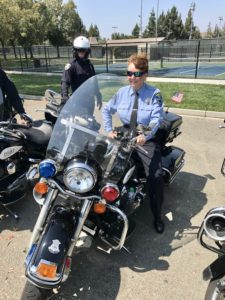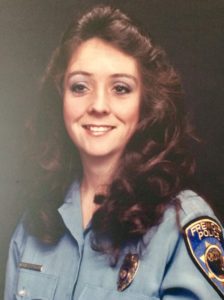Last month, Donna Gott retired from her job as a Community Service Officer for the City of Fremont 30 years to the day from her first day in 1987. She spoke with us about her time serving her community, working as a Shop Steward, and what it means to be a Teamster.
How did you become a Community Service Officer? I was dating a police officer who subsequently became my husband. At the time, I was stuck in job in Hayward that I hated. It was monotonous and boring, and not paying the bills. I even delivered pizzas at night.
He suggested I put in for this job that was opening, and the fact it was outside and everyday would be different was interesting to me. Over 350 people applied, so I was really lucky to get hired. Things just fell into place. Instead of working two jobs, I went to one job working a nine-hour shift. It paid the bills and gave me free time. It was a good fit for me. Plus, I grew up in Fremont, so I was already invested in the community.
What does being Teamster mean to you? I was there about six months before we voted to become Teamsters. We wanted to be represented and heard, and the benefits we were afforded through Teamsters were far greater than anything the city was offering.
Teamsters gives you a voice and backs up your voice, and I really appreciate what Teamsters has given me. I’m able to retire with medical, live within my means, and travel. I have friends who aren’t going to be able to retire until they’re 90 years old. The groups that our local represents are so diverse, and that’s what it’s about – banding together and making sure that all people are taken care of.
Why did you become a Shop Steward? I became a Shop Steward six years ago when another Steward retired. I wanted to make a difference and have my voice heard, and the voices of the other Community Service Officers heard.
What was a normal day on the job like for you, if there is such a thing? Community Service Officers take care of all of the reactive crime reports – all the cold reports, which is a majority of police work. Our work frees up the police officers to do the proactive work.
My last assignment was in traffic. My primary job was to deal with vehicle abatements, abandoned vehicles, and all traffic complaints. I’d come in and check for complaints and respond to them. I did parking enforcement and patrol. Sometimes I was contacting the citizen, other times it was issuing warnings, and other times it was issuing citations.
What are you most proud of about your work? We were always trying to adapt to the demographic of the city, because we are so diverse in population. Several years ago, we had a whole series of cultural diversity trainings where we learned about different people and how to approach them with respect and earn their respect. We put the time in to treat people as people, and to serve the public without prejudice, which really isn’t that hard to do.
What will you miss most about your work? I’ll miss the people. I’ll miss seeing my police family. We’re with our police family almost as much as our own family.
What are you plans for retirement? We’re going all over the place for a month: England, Barcelona, Rome, Florence, and Venice with friends. Then my husband and I will cruise out of Rome to Israel and Greece.
I told my husband I was going to take six months to decompress and relax, but that hasn’t happened. I’ve been party planning for friends and family. I just finished a celebration of life and a wedding, and have more coming up.
Any final thoughts? I am very passionate about what I did on a daily basis, and the job that I did. I tried to give more than 100% every day that I went to work. There were some really tough days. I went to some calls that were heart wrenching that I will carry with me for the rest of my life, but I love the citizens of Fremont.
To my fellow Teamsters: Thanks for being there for me, and continue to be there for each other.



